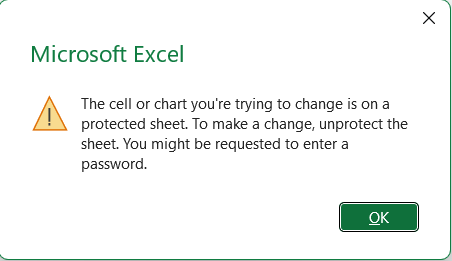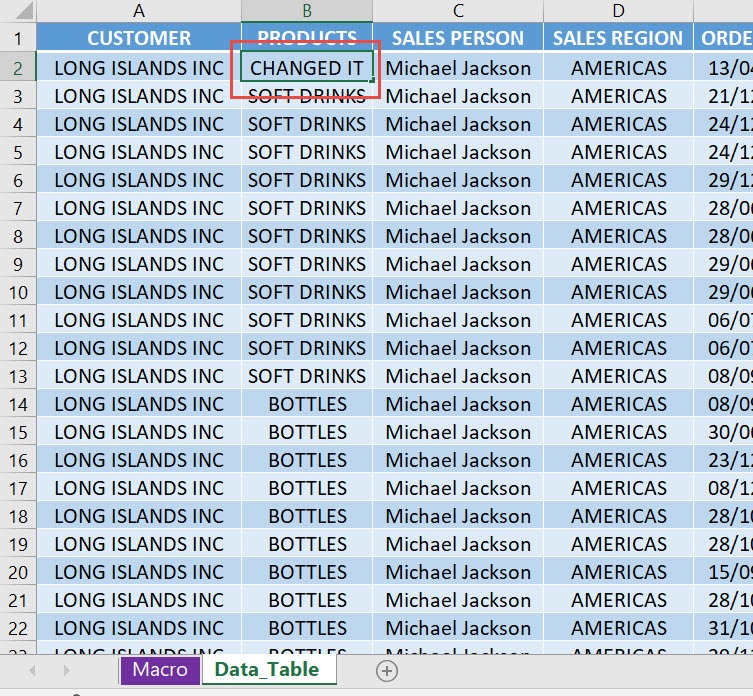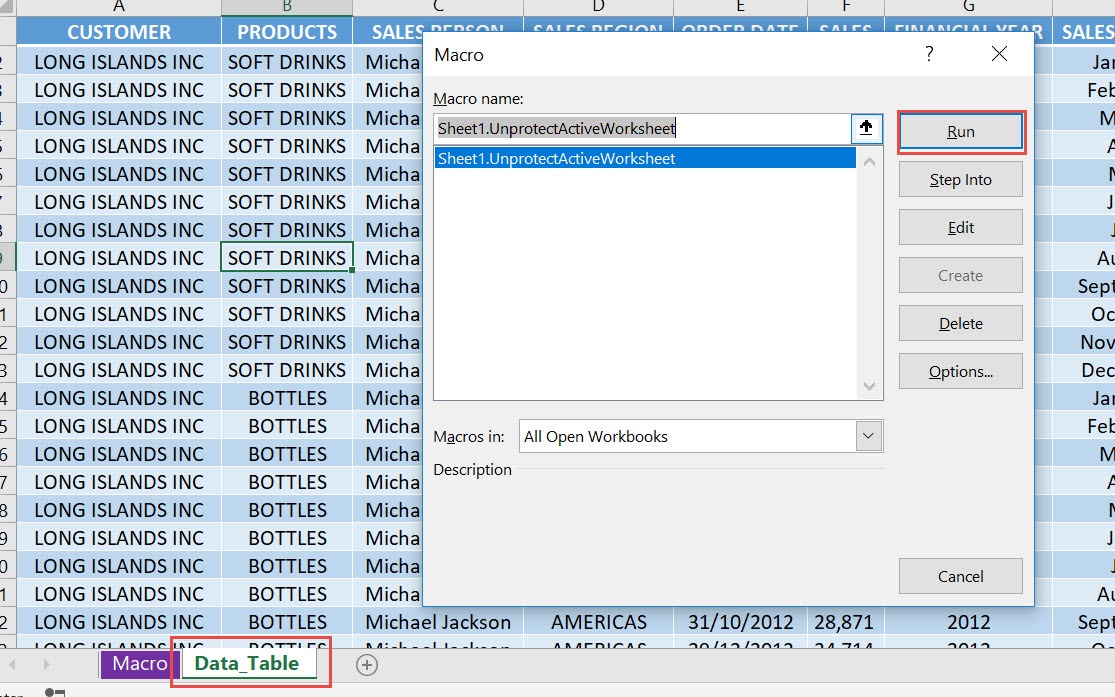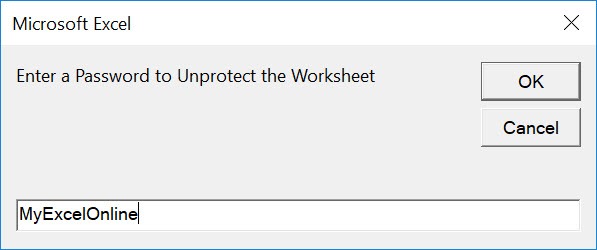Ever wondered how to unprotect the active worksheet using code? Let us show you how to unprotect the active worksheet with Excel Macros! Make sure your Excel has the Developer Tab enabled following this tutorial. I explain how you can do this below step by step!
Key Takeaways:
- Automating Worksheet Access: Using a macro to unprotect an active worksheet streamlines access for authorized users, making it easy to unlock protected sheets without manually entering a password each time.
- Password Management: You can include a password within the macro code (e.g.,
ActiveSheet.Unprotect Password:="YourPassword") to securely manage access and ensure only users with the macro can unprotect the sheet. - Efficient Workflow for Large Workbooks: If you work with multiple protected sheets, using a macro to unprotect and re-protect sheets as needed improves workflow efficiency, reducing repetitive steps and saving time on large projects.
Table of Contents
Overview
What does it do?
Unprotect the active worksheet
Copy Source Code:
Sub UnprotectActiveWorksheet() Dim pword As String 'Get the password from the user pword = InputBox("Enter a Password to Unprotect the Worksheet") 'Unprotect the Active Worksheet ActiveSheet.Unprotect pword End Sub
Final Result:
Unprotect Active Worksheet Using Macros In Excel
This is our worksheet, it is locked at the moment.
STEP 1: Go to Developer > Code > Visual Basic
STEP 2: Paste in your code and Select Save. Close the window afterwards.
STEP 3: Let us test it out!
Open the protected sheet. Go to Developer > Code > Macros
Make sure your macro is selected. Click Run.
Type in the password to unlock the sheet. Click OK.
Now your sheet is now unprotected! We can now try editing the sheet.
Understanding Sheet Protection
Reasons Why Sheets are Protected in Excel
In Excel, protecting sheets is like placing a shield around your precious data, preventing unwanted alterations. This protection is typically applied when you’ve crafted a masterpiece of a report or a dashboard teeming with intricate calculations. Your goal? To ensure that users, who might be your colleagues or even your boss, can’t unintentionally edit or delete something vital. It’s all about keeping the integrity of your spreadsheets intact while allowing flexibility where needed.
Limitations and Considerations When Sheets Are Locked
When sheets are locked in Excel, they become a fortress of sorts, keeping data safe but also placing some restrictions on how you can interact with them. For starters, most edits are off the table; that includes writing in cells, making structural changes, and altering the layout. However, not everything is locked down tight. You can decide to keep certain operations live, like sorting data or formatting cells, which offers a happy medium between security and usability.
Bear in mind that these limitations only come into effect once the sheet is officially protected. If you don’t activate that protection, it’s like having a security system but not turning it on – everything remains accessible and editable. Plus, Excel’s version matters too. For example, what takes mere seconds in older versions might be sluggish in newer ones, so managing larger workbooks with multiple sheets could require a healthy dose of patience.

Best Practices for Using VBA Macros Responsibly
Securing Your Macros from Unauthorized Use
Securing your VBA macros from the unauthorized tinkering is akin to putting a virtual guard dog in your code, and it’s crucial for ensuring your macro only does its magic for the right people. To button up your macro security, you might consider using a password in the VBAProject Properties, which puts a padlock on the project, restricting others from peeking at your code or making any alterations without the proper credentials.
Managing and Documenting Code Changes for Future Users
Imagine your VBA macros as a well-trodden path through a forest; each user leaves their footprints – code changes, tweaks here, and adjustments there. To avoid the path becoming a bewildering maze for future travelers, it’s essential to manage and document those changes meticulously.
Think of it as leaving a breadcrumb trail in your code, where each crumb is a comment explaining why a change was made. This makes it a breeze for the next person to understand what was done and why. Plus, if issues arise down the line, you’ve got a map to trace your steps back to where things might have gone awry.
And don’t forget version control; it’s like having a series of photos of the path over time. Users can see how it’s evolved and revert to previous states if necessary. Whether you’re using a sophisticated system like Git or a simple shared drive setup, keeping a well-documented history of your macro is a gift to anyone who may inherit your code.
Focus on these elements to keep your VBA code understandable and user-friendly:
- Comment regularly and meaningfully: Use ‘single-quote’ marks in VBA to add context to your code lines.
- Version history tracking: Add a simple header at the top of your macro with the date, author, and a summary of changes each time someone makes an update.
- Use clear variable names: Make your code self-explanatory to an extent by choosing variable names that describe their use.
- Create a user guide: Offer a helping hand by crafting a separate document or adding a readme file that guides users through the macro’s purpose and workings.
Frequently Asked Questions
How do I create a macro to unprotect the active worksheet?
To create a macro to unprotect a worksheet, press ALT + F11 to open the VBA editor. In the code window, enter:
Sub UnprotectSheet()
ActiveSheet.Unprotect Password:="YourPassword"
End Sub
Replace "YourPassword" with the actual password. Run the macro to unprotect the active sheet automatically.
Can I use a macro to unprotect multiple sheets at once?
Yes, you can. Use a loop to unprotect multiple sheets by adding this code:
Sub UnprotectAllSheets()
Dim ws As Worksheet
For Each ws In ThisWorkbook.Sheets
ws.Unprotect Password:="YourPassword"
Next ws
End Sub
This will unprotect all sheets in the workbook at once using the specified password.
Is there a way to temporarily unprotect a sheet and then protect it again with a macro?
Yes, you can unprotect the sheet, perform actions, and then re-protect it in a single macro. Use code like this:
Sub TemporaryUnprotect()
ActiveSheet.Unprotect Password:="YourPassword"
' Add actions to perform on unprotected sheet here
ActiveSheet.Protect Password:="YourPassword"
End Sub
This temporarily unlocks the sheet for any edits or actions, then re-locks it.

Bryan
Bryan Hong is an IT Software Developer for more than 10 years and has the following certifications: Microsoft Certified Professional Developer (MCPD): Web Developer, Microsoft Certified Technology Specialist (MCTS): Windows Applications, Microsoft Certified Systems Engineer (MCSE) and Microsoft Certified Systems Administrator (MCSA).
He is also an Amazon #1 bestselling author of 4 Microsoft Excel books and a teacher of Microsoft Excel & Office at the MyExecelOnline Academy Online Course.













